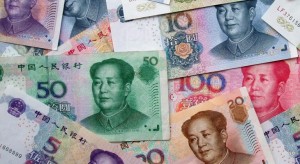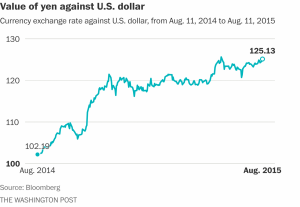China is seemingly buying up a lot of Bitcoin and alternative currencies like gold right now. The devaluation of their currency has been slashed over the course of the past month. The country's Foreign Exchange Commission has ordered financial institutions to increase its checks and balance controls for capital outflow. Currency wars in the region have led to a massive monetary dump as China's Black Monday looms and looks to a very rough financial week. This has sparked an interest in alternative currency vehicles and China's buying volume in Bitcoin has increased. Chinese exchang es are also reporting significant a price spread between them and U.S. exchanges.
Also read: How Bitcoin will Make GoPro Awards Even Better
 As well as Bitcoin purchasing, gold, and precious metals(PM) in China is not a new fad happening in the area, in fact, the country has confirmed that its bullion reserve interests have jumped 60% since 2009. Despite this emergency PM buying throughout the land, banks are regulating the gold markets and other safe havens heavily. Tommy Ong of DBS Bank Hong Kong told Bloomberg News that Banks are regulating the outflow realm to help stop more damage to the yuan. Ong explains: "The main objective is to reduce volatility, curb capital outflows and limit depreciation pressure on the yuan."
As well as Bitcoin purchasing, gold, and precious metals(PM) in China is not a new fad happening in the area, in fact, the country has confirmed that its bullion reserve interests have jumped 60% since 2009. Despite this emergency PM buying throughout the land, banks are regulating the gold markets and other safe havens heavily. Tommy Ong of DBS Bank Hong Kong told Bloomberg News that Banks are regulating the outflow realm to help stop more damage to the yuan. Ong explains: "The main objective is to reduce volatility, curb capital outflows and limit depreciation pressure on the yuan."
The Bitcoin price is rising high as Chinese CNY/BTC volume is increasing exponentially this week and over the course of the past month trading nearly 1 million BTC daily. Volume and price on the largest Chinese Bitcoin exchange, Huobi, is higher than most of the smaller US and UK crypto-exchanges combined. The trade of Bitcoin/Yuan captures a very large portion of the market currently. Most likely due to cheaper electricity costs, zero trading fees and the serious devaluation of the sovereign currency over the past few years. Goldman Sachs analysts led by Peter Oppenheimer say that a third wave of economic crisis is happening globally. The analyst believes that this economic shift is characterised by Chinas stagnate growth and worldwide commodity lows. Goldman Sachs says that because of Chinas rise in investments after the 2008 crisis and then trying to transform its economy at the same time has helped stall its growth with poor and inefficient investments.
 During the first week of July, the Chinese stock market has plunged over the course of a three-week drop losing 2.36 trillion in market value. The Shanghai Composite and Shenzhen Composite both plunged roughly 30% that month and caused a stir of fear in the global economy. With the looming fear of inflation from devalued currency many markets have felt the economic shift pushing alternative international venues. However, the People's Bank of China is requiring all banks to pay a deposit before forwarding sales to markets overseas. With these financial edicts, citizens are finding it harder to reallocate wealth within the traditional stock, bonds, and even PM markets. This is possibly why the Bitcoin volume in China is surging as U.S. dollars, and alternative currency options are seemingly viable throughout economic shakes and currency devaluation.
During the first week of July, the Chinese stock market has plunged over the course of a three-week drop losing 2.36 trillion in market value. The Shanghai Composite and Shenzhen Composite both plunged roughly 30% that month and caused a stir of fear in the global economy. With the looming fear of inflation from devalued currency many markets have felt the economic shift pushing alternative international venues. However, the People's Bank of China is requiring all banks to pay a deposit before forwarding sales to markets overseas. With these financial edicts, citizens are finding it harder to reallocate wealth within the traditional stock, bonds, and even PM markets. This is possibly why the Bitcoin volume in China is surging as U.S. dollars, and alternative currency options are seemingly viable throughout economic shakes and currency devaluation.
The three largest Bitcoin exchanges trading in CNY are currently swapping close to a million BTC per day according to Bitcoinity. Bitcoin's price at press time is up 5% overall within the top Chinese exchanges. With volume and price, there is much debate on whether the numbers in China are what they say they are. Contention on this issue has been debated since Goldman Sachs reported 80% of Bitcoin transactions were traded in Yuan.
Overall the volumes on Chinese exchanges are showing growth in the digital currency realm. Numbers according to pages such as Coin Market Cap, and Bitcoinity are slightly different on each website but all show increases. The devaluation of Chinese sovereign currency is very real, and the region's stock market is regularly fumbling. Movement into alternative markets with less capital control is not a far off theory as its been proven in countries like Greece. Bitcoin has become a financial haven with gold and silver, and Chinese buyers are eating these assets up. The continued devaluation of the yuan will enable trading solutions like Bitcoin to be a superior trading choice for investors.
What do you think about the volume increase in China? Let us know in the comments below.
Images courtesy of Redmemes, Localbitcoins, Bloomberg/Washington Post, and Pixbay
Originally posted on: Is China Turning To Bitcoin As Yuan Devalues?
